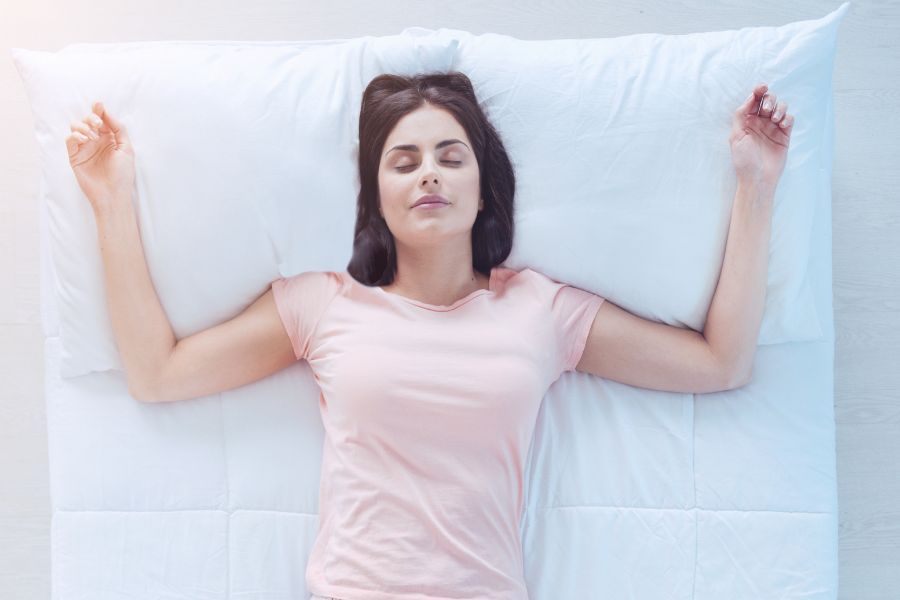There are many possible sleeping positions, but if you sleep with your arms above your head, you might be wondering if this is normal because most people probably imagine that this position isn’t so common.
Well, we can put your mind to rest from the start because it’s not odd at all – but there’s a lot more to know about this topic, and in this post, we have all the info you need about sleeping with your arms above your head.
Two “Arms Up” Sleeping Positions

When the time comes to turn the lights out and lay our heads down to sleep, there are many different positions we can adopt, but all the possible postural variations we can choose belong to one of three main categories: back sleeping, side sleeping or front sleeping.
Then, depending on the position of your arms and the shape of your body, each variation has a name.
For example, sleeping on your side with your body curled up is known as the “fetal” position, while sleeping on your side lying straight and with your arms by your side is known as the “log” position.
When it comes to sleeping with your hands above your head, there are two options.
Sleeping on your back with your hands above your head is known as the “starfish” position. It’s not a common position, with only around five to seven percent of adults commonly sleeping this way, depending on which data you use.
The sleeping position where you lie on your front with your arms around your head or under the pillow is known as the freefall position.
This is a more common sleeping position, with around 17% of people choosing to sleep this way – but at the same time, over a quarter of people claim this is the worst and least comfortable position for sleep.
But what are the pros and cons of sleeping in these positions? And how do they affect our sleep quality and overall health? Let’s break it down now.
How Does Starfish Sleeping Affect Neck, Back and Shoulder Pain?
Shoulder pain is a common affliction, and many people suffer from this condition at some point in their lives.
However, some research has shown that sleeping in the starfish position may help to relieve pain in the shoulders.
By contrast, those who adopt the “soldier” position, a sleeping position where you lie on your back with your arms by your sides, were found to have higher rates of shoulder pain than starfish sleepers.
This suggests that if you suffer from shoulder pain, switching to the starfish posture may have some benefits.
On the other hand, when it comes to back and neck pain, the results are less conclusive – although still positive.
Research on back pain has shown that sleeping on your back – in the starfish pose or otherwise – can help relieve lower back pain in some sufferers while increasing it for others.
More research is needed to confirm these findings, but if you are suffering from back pain, switching to the starfish position may be at least worth trying.
Similarly, sleeping on your back in the starfish position can help with neck pain since it helps keep your head, neck and spine stay aligned – as long as your hands are held in a symmetrical position.
How Does Starfish Sleeping Affect Snoring?
Snoring occurs because when we sleep, our muscles relax. Then, as we breathe, air passes through our soft palate, tonsils, adenoids and tongue, and if there is a partial blockage there, this causes the tissues to vibrate.
Back sleeping generally is known to be particularly conducive to snoring, so if you want to stop snoring, one suggestion is to switch to side sleeping.
However, it is also thought that starfish sleeping is better than other back-sleeping positions since holding your arms above your head helps open the airways.
Furthermore, if you don’t fall asleep in the starfish position but often wake up like this, it could be a sign that you are adjusting your position during the night due to some kind of difficulty breathing that may also cause you to snore.
That said, sleeping on your side or even on your front is considered better for the reduction of snoring than any back-sleeping posture.
Is Starfish Sleeping Comfortable?
When it comes to the question of comfort, the answer is that the experience of starfish sleeping is subjective. While some people may find it comfortable to sleep like this, others may find it unnatural. So in the end, it comes down to individual preference.
Pros and cons of starfish sleeping
Pros
- Can ease shoulder pain
- May alleviate neck and back pain
- May be better for snoring than the soldier position
- Some people find it comfortable
Cons
- Some people may find it leads to back pain
- Not as good as side sleeping for reducing snoring
- Unnatural position for many people
How Does Freefall Sleeping Affect Neck and Back Pain?
In general, most sleep specialists don’t recommend sleeping on your front, however you position your arms.
This is because this position means you have to sleep with a bent neck, so your head, neck and spine won’t be properly aligned as you sleep.
If you then stay in this position without moving for the whole night, you are likely to wake up with a stiff neck at best – and at worst, it may also cause you to suffer from neck and back pain throughout the day.
Furthermore, it is not thought that sleeping with your arms above your head or in any other position affects this. So in short, the freefall position is not ideal if you suffer from neck or back pain.
How Does Freefall Sleeping Affect Snoring?
When it comes to snoring, front sleeping is considered better than any form of back sleeping. This is because this position helps keep your airways open more than if you adopt a back sleeping position.
However, this is true of any front sleeping position compared with any back sleeping position and doesn’t relate specifically to sleeping in the freefall position.
Is Freefall Sleeping Comfortable?
Like with the starfish position, the experience of freefall sleeping is subjective, with some finding it comfortable and others finding it uncomfortable.
However, the stats we quoted above show that this position divides opinion.
As we mentioned, nearly a sixth of people choose this as their preferred sleeping position – while more than a quarter choose it as the worst. So what this shows is that it’s really up to you!
Pros and cons of freefall sleeping
Pros
- Can help reduce snoring
- Many people find it comfortable
Cons
- Twists neck and may result in stiff neck as well as neck or back pain
- Many people consider this position the worst of all to sleep in
What About for Babies?

Although, as we mentioned above, only five percent of adults sleep in the starfish position, if you’ve ever seen a newborn baby sleeping, you’ll be aware that for them, it’s quite a common position. But is this normal?
The answer is, yes, it is.
In the past, people were encouraged to put babies to sleep on their fronts, but the advice nowadays is to avoid this because front-sleeping babies are most at risk of sudden infant death syndrome (SIDS).
Instead, current advice is for babies to sleep on their backs, following the mnemonic saying “back to sleep” – and when babies sleep on their backs, it’s quite normal for them to raise their hands up above their heads.
This is due to what’s known as the Moro reflex, a startle reflex that sees the baby adopt this position as a kind of defense mechanism. Babies tend to do this when they are disturbed, even if they don’t wake up fully, and will continue to sleep in this position thereafter.
This means the starfish position is perfectly normal for newborns and is safe as long as there are no toys or other objects in their bed with them – but this reaction usually fades by around the six-month mark.
Also Read: Sleeping Without A Pillow
FAQs
Why Do I Sleep with My Arms Above My Head?
There are several reasons why you might sleep with your arms above your head. It could just be that you find it most comfortable, or you could adopt the position unconsciously because it helps you breathe more easily during the night.
On the other hand, it could be a conscious choice because you find it relieves shoulder, neck or back pain – and it could even be a conscious or unconscious choice because you want to make more space for your bed partner or because you want to invite more cuddles!
Is It Bad to Sleep with My Arms Above My Head?
No, there is no evidence that sleeping with your arms above your head causes any problems in itself.
However, some people may find that sleeping in the starfish position causes neck or back pain (even though others may find it helps alleviate pain), and some people may find that sleeping in the freefall position also gives them a stiff neck or causes back or neck pain.
Why Do Babies Sleep with Their Arms Up?
Babies often sleep with their arms above their heads due to the Moro reflex, a kind of defense reflex that tells them to adopt this position when startled.
However, it’s perfectly normal and nothing to worry about. It’s a much safer position for a baby to adopt for sleeping than front or even side sleeping since it reduces the chances of SIDS occurring.
A Matter of Personal Preference
As we’ve seen many people sleep with their arms above their head, either in the starfish position or in the freefall position, so if you sleep in either of these positions, there’s nothing wrong with you.
However, each position has certain pros and cons in terms of comfort, pain and snoring, so the position you sleep in comes down to personal preference and which position you find works best for you.
